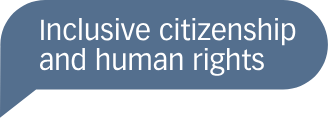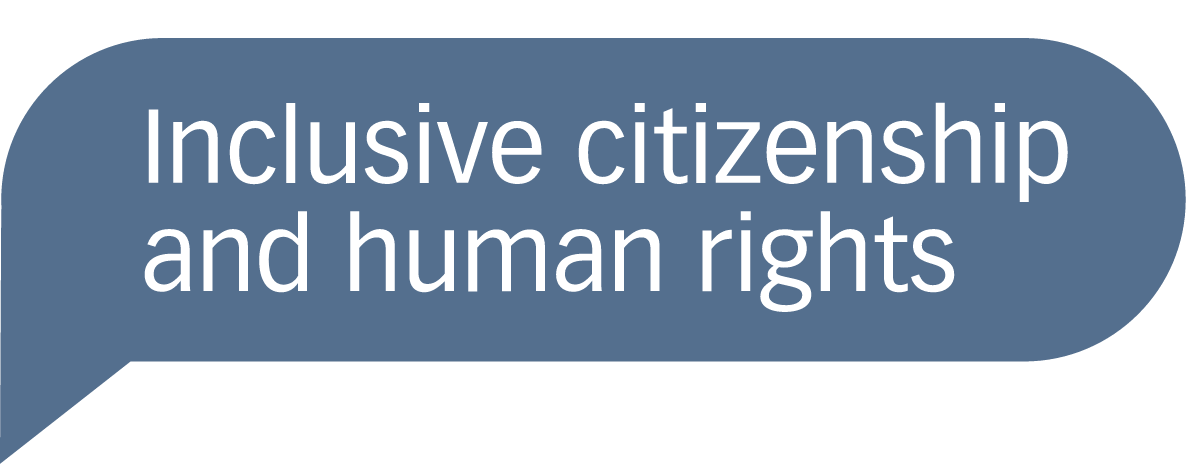Article
Anti-Muslim Racism
Anti-Muslim racism or Islamophobia can be defined as widespread negative prejudices towards Muslims, false or grossly exaggerated negative claims about Muslims, and actions and practices that attack, exclude, or discriminate against people because they are, or are assumed to be, Muslims.
Author: Dr. Cora Alexa Døving, Researcher at the Norwegian Center for Holocaust and Minority Studies
Published: February 2025
What is Anti-Muslim racism?
“Man is before he acts; nothing he does may change what he is. This is, roughly, the philosophical essence of racism.” wrote sociologist Zygmunt Bauman (2005: 96) (2005: 96). This form of pre-judgment is also a fundamental part of what we refer to as anti-Muslim racism or Islamophobia. Examples of such typical pre-judgment include claims like: Muslims are against democracy, they are fanatical, they dislike individual freedom, they don’t want to integrate, and they are brutal (Gardell 2011). However, there is a difference between prejudice against Muslims and what we can call anti-Muslim racism: When prejudices are combined into ideological systems used to argue that Muslims should be excluded, subordinated, or discriminated against because they are Muslims, we can define it as anti-Muslimism racism (or Islamophobia).
We can call something anti-Muslim racism when: Anti-Muslim attitudes consists of widespread negative prejudices, false or grossly exaggerated negative claims about Muslims, and actions and practices that attack, exclude, or discriminate against people because they are, or are assumed to be, Muslims.
Thus, we can speak of anti-Muslim racism when Muslims are attributed inherently negative qualities and discriminated against simply because they are Muslims.
Islamophobia? – A question of concepts
Internationally, the term Islamophobia is often used to describe what we in this text refer to as anti-Muslim racism. We have chosen the term because the phenomenon the term describes is closer to an ideology that creates an enemy image and to discrimination than it is to a phobia in the psychological sense. The term Anti-Muslim racism also better captures the fact that what we describe involves ideas and actions directed against Muslims, not against Islam as such. By emphasizing people rather than a belief system, the similarity to racism also becomes clearer. The Runnymede Trust changed their own use of the term Islamophobia to “anti-Muslim racism” in their report from 2019. (Although claims about Islam are indeed a crucial element, negative ideas about Muslims are often based on assumptions about what Islam is.
What does hostility toward Muslims look like?
Anti-Muslim racist ideas can be found both on the left and right of the political spectrum in contemporary Europe. However, they are most widely circulated on certain far-right websites and Facebook groups. Anti-Muslim racism form a core part of the ideology within emerging right-wing populism and extremism in Europe. Nonetheless, prejudice against Muslims is also common among the general population. A survey by the HL Center in 2022 showed that 30.7% of Norway’s population held widespread prejudices against Muslims (Moe 2022).
In the survey the respondents were asked how much they agreed with the following statements, and the numbers represent those who answered either “somewhat agree” or “strongly agree”:
- “Muslims pose a threat to Norwegian culture”: 33% agreed.
- “Muslims are more violent than others”: 26% agreed.
- “Muslims do not want to integrate into Norwegian society”: 39.7% agreed.
- “Muslims want to take over Europe”: 24.7% agreed.
When certain prejudices persist and become widespread, it can be explained by their long circulation and establishment as anti-Muslim claims. Anti-Muslim racism is built on a set of negative stereotypes that have emerged in several Western European countries over the last 20-30 years. Some of the most common stereotypes are that Muslims are: ruled by a hateful god, that they abuse and oppress women, that Muslim men are driven by primitive sexuality, that Muslims lack humanism, despise democracy, are uncivilized and violent, and do not want to integrate. Additionally, terrorism is often portrayed as something inherently tied to “the Muslim,” who is perceived as wanting to impose everything “ours” under Islam and who does not shy away from terrorism (Werbner 2014: 72-74).
Religion as a reference
The religion of Islam serves as a clear reference point in anti-Muslim racism. Islam is presented in a specific way, such as:
- Static (incapable of change).
- Fundamentally different from all other religions and cultures.
- Barbaric, irrational, primitive, and sexist.
The fact that Muslims come from diverse cultures and countries, interpret their religion in different ways, and practice varying levels of religiosity is ignored in this mindset.
“They want to take over our country”
One of the core claims in an anti-Muslim worldview, is the idea that Muslims want to take over Europe—that this is why they came as labor migrants or refugees: They had an underlying motive. One of the theories about how Muslims plan such a takeover is referred to as the Eurabia theory. In short, it describes how Muslim leaders collaborate with European political leaders and bureaucrats in various EU bodies as part of a takeover of Europe. The idea that Muslims do not speak truthfully is a crucial part of the Eurabia theory: they “pretend to stand for values we fight for.” The phrase “speaks with two tongues” is commonly used in Muslim-hostile forums (Døving & Emberland, 2021). This idea of takeover and deceit was central to the motivation behind the terrorist attack in Norway on July 22, 2011.
More than ideas …
Anti-Muslim racism is not just ideas that exist in the minds of those who hold them, but something Muslims can encounter in everyday routines, such as in the form of questions or comments—during job interviews, in a taxi queue, in the lunchroom, or at a Christmas party (for examples see Moe and Døving 2022).
In the HL Center’s 2022 report on experiences among minorities, Muslims in Norway reported that one common negative experience is being made to feel like they don’t belong: 43% of Muslim respondents said they had often or sometimes been made to feel like they don’t belong in Norwegian society over the past 12 months (Moe 2022). Other studies show the same: being excluded from the Norwegian community is one of the most common descriptions of negative experiences as Muslims (Friberg 2021, Moe and Døving 2022). The internet is also a space where negative prejudices are encountered: among Norwegian school students, those with a Muslim background are most often targeted by hate speech online, particularly against their religion (Nadim and Fladmoe 2021).



